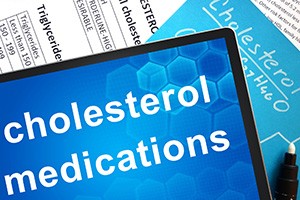Statin drugs and CoQ10

Research has shown that statin drugs deplete the body of a very important nutrient called coenzyme Q10 (CoQ10), which has the responsibility of producing cellular energy.
by Dr. Fred Arnold —
It is a common belief of many medical professionals that statin drugs lower the incidence of cardiovascular disease by lowering LDL cholesterol. LDL cholesterol levels are considered the “bad cholesterol,” which is why many doctors prescribe statin drugs to lower it. However, a recent study in the Journal of Clinical Nutrition shows that LDL cholesterol levels do not lower heart disease risk and do not reduce the incidence of dying from a heart attack.
According to this recent study, the researchers looked at 1,469 women between the ages of 72 and 78 and the relationship between their LDL levels and chances of dying from cardiovascular disease. Their LDL levels were measured, and their health histories followed for 10 years.
During the 10-year period, 134 women died from cardiovascular disease unrelated to high LDL levels. They discovered that: “Baseline serum total and LDL cholesterol were not associated with atherosclerotic vascular disease mortality.” The women with the highest levels of LDL cholesterol were no more at risk than those with the lowest levels.
Although LDL cholesterol has no effect on dying, they did find that a diet high in saturated fat was associated with the risk of atherosclerotic vascular disease mortality. When they looked at how much saturated animal fat the women were eating, they discovered that those who ate the most animal fat had three times the risk of dying (16 percent death rate in 10 years) than those who ate the least (5 percent death rate).
Statin drugs
Examples of statin drugs include atorvastatin (Lipitor®), rosuvastatin (Crestor®), simvastatin (Zocor®) and lovastatin (Mevacor®).The most common statin side effects include headache, difficulty sleeping, muscle aches, tenderness or weakness, drowsiness, dizziness, nausea or vomiting, abdominal cramping or pain, and bloating or gas and diarrhea. Other side effects include diabetes, dementia, memory loss, muscle wasting and heart failure. It is important to remember that statins may also interact with other medications.
Some people who take statin medication to lower their cholesterol may have severe muscle pain, and this intense pain is a symptom of rhabdomyolysis.
The most common signs and symptoms of rhabdomyolysis include severe muscle aching throughout the entire body, muscle weakness, and dark- or cola-colored urine. The higher the dose of statins, the higher the risk of rhabdomyolysis becomes. If you have moderate to severe muscle aches after starting a statin drug, you should stop taking it and seek medical care.
CoQ10
Research has shown that statin drugs deplete the body of a very important nutrient called coenzyme Q10 (CoQ10), which has the responsibility of producing cellular energy. However, as you age, your natural levels decrease. Therefore, if you are older and taking a statin drug, you increase the chances of side effects. Although the research has established this fact, very few patients are ever told of this cause-and-effect relationship.
Taking CoQ10 supplements can help increase the levels in the body and reduce statin-related problems. Research shows that taking CoQ10 supplements might also function as a natural treatment to help reduce cholesterol, lower blood pressure, improve energy and treat heart conditions (arrhythmia, congestive heart failure and coronary heart disease).
Although CoQ10 has few side effects, the most common is stomach upset. CoQ10 can also lower blood sugar, so diabetics need to be careful or avoid it altogether. If you are taking a blood thinner, this enzyme should not be used without the close supervision of your doctor. Anyone taking a statin drug should consider a CoQ10 supplement.
Cardiovascular alternatives
Based on the evidence that statin drugs do not always prevent cardiovascular disease, other considerations to lower cardiovascular risk should also be considered:
- Diet — Reduce simple carbohydrates, starch and saturated fat in the diet and include 30 to 40 grams of fiber daily.
- Lifestyle — Reduce stress and alcohol consumption, get adequate sleep and perform regular exercise.
- Supplements — Take fish oil, nitric oxide supplements and niacin.
- Hormones — Keep your hormones balanced and replace any deficiencies with bio-identical hormones.
- Chelation intravenous (IV) therapy — A seven-year clinical trial funded by the National Institutes of Health called Trial to Assess Chelation Therapy involved 1,708 patients and 55,222 IV chelation infusions. The study showed important cardiovascular improvement in patients who received chelation IV therapies.
Each of these steps can help protect your heart without causing the serious side effects of statin drugs. In conclusion, if you are taking a statin drug, learn about its potential side effects and be aware that it does not always lower cardiovascular risk. Consider supplementing with CoQ10 to offset the side effects of any statin drug. Know that there are many other ways to lower cholesterol and reduce cardiovascular risk.
References
1. Blekkenhorst, L.C., Prince, R.L., et al. Dietary saturated fat intake and atherosclerotic vascular disease mortality in elderly women: a prospective chart study. Am J Clin Nutr., 2015 May 6.
2. Wartian Smith, P., M.D., MPH, What You Must Know About Vitamins, Minerals, Herbs & More, Choosing the Nutrients That Are Right For You, Square One Publishers, Garden City Park, NY, 2008, pp. 189-191.
3. WebMD, Statins, Side Effects of Cholesterol-Lowering Statin Drugs.
Fred G. Arnold, N.M.D., has more than 20 years of clinical experience and specializes in pain rehabilitation services. He is certified in prolotherapy by the American Association of Orthopedic Medicine, a Fellow in Anti-Aging & Regenerative Medicine, a Fellow of American Academy of Ozonotherapy and certified in chelation. He is one of the few physicians in the nation with both a naturopathic medical degree and chiropractic degree. prolotherapyphoenix.com or 602-292-2978.
Reprinted from AzNetNews, Volume 34, Number 4, August/September 2015.





September 22, 2015
August/September 2015, Featured, Vitamins, Minerals and Supplements